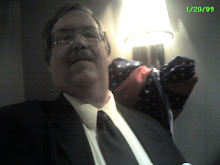UPDATED BELOW
Paul Krugman has an article in this week's New York Times magazine about the disarray in macroeconomic theory. In simplest terms, neither the New Classical nor New Keynesian economic theories are able to explain how the American economy got into its current parlous condition. Krugman identifies, correctly, the root of these problems in the economics profession's insistence on grounding economic models in perfectly rational behavior.
As he points out, a brave band of the economics tribe has insisted for years that such approaches to behavioral modeling are deeply flawed. The basis for this assertion is (wait for it) observation of consumer and investor behavior that is (gasp) irrational. However, as a professor in my own economics doctoral program observed, "You can't bash a theory with facts, you bash a theory with another theory." The purpose of this post is to point out that the hyper-rationality in behavior which is the foundation of modern macroeconomic (and other economic) theories is based upon a profoundly uneconomic assumption.
The basic premise of theoretical economics is that scarcity is an inescapable fact of human existence. The resources available to perform useful tasks and create useful artifacts fall far short of the total number of useful tasks and things that we can conceive. In short, to quote Bob Seeger, we must decide, "what to leave in, what to leave out."
Two observations follow from this. First, societies develop mechanisms to facilitate making those difficult choices. (Ours is a market economy where the tasks and things are chosen by consumer's willingness to sacrifice the resources they command to see those tasks accomplished and those things created. As a card-carrying economist, I have to approve of this and do.)
The second observation is that there is pain involved in making choices. By choosing to produce left-handed cement stretchers, we commit resources that we can't then use for other desirable projects such as reversible doohickeys. We accept that pain as the opportunity cost of the choice. Scarcity shackles all of our actions with opportunity costs.
The great Nobel Laureate Ronald Coase pointed out over seventy years ago, that even desirable activities like pursuing gains from trade through market transactions have opportunity costs. (These are what are today termed transaction costs.)
The problem with rationality
Rationality in economics involves the assumption that individuals will adopt the most effective methods for achieving their goals. (Utility and Profit Maximization) One of the benefits of the rationality assumption for economic theory is that it permits employing the sophisticated mathematical tools in modeling maximization processes. However, there is an unexamined cost in doing so. (Remember, everything we do has an opportunity cost.)
The rationality assumption as usually employed has the effect of assuming that many of the opportunity costs of decision-making are zero. As noted above, this is a profoundly uneconomic assumption. Specifically, the first assumption about decision-making is that the costs of acquiring information are essentially zero. (There are some Industrial Organization models that do incorporate informational costs but the impact on theory seems to be quite limited.) The second assumption is that information processing capacity is unlimited and costless. Once again this assumption flies in the face of the foundation principle of scarcity. In the same vein, it is assumed that information storage capacity is unlimited and costless. Finally, the assumption is made implicitly that decision makers apply the appropriate model to the decision at hand. Where did that model come from? Apparently it dropped like manna from heaven (i.e. costlessly) into the cerebrum of our hyper-rational decider.
The prime example repeatedly cited by both Krugman and Brad Delong of this uneconomic modeling is the Efficient Markets Hypothesis, or at least its stronger versions. The logic of the weaker versions where price discrepancies are quickly eliminated through arbitrage is mostly unassailable. This does require that 1) individuals recognize the discrepancy, requiring both information and processing capabilities which are not free and 2) have sufficient liquidity to exploit those discrepancies, a point Krugman mentions in his article. It is worth noting here that one of the reasons economists like easily accessible, transparent, and liquid markets is that the operation of supply and demand in such markets generates information about opportunity costs in the form of prices which help decision makers get their decisions right.
The stronger version of EMH postulates that the price of a security at all times reflects all of the publicly available information about the present value of that security in terms of its future income flows. The problem with this is mentioned above, is there any guarantee that the model used to value those future income flows is the correct one? If the model is largely reality based, I'm sure that the price of securities comes very close to proper valuation. The difficulties arise where there is some "irrational exuberance" e.g. the Internet bubble when the mere existence of the Internet was going to change everything and the values of traditional "bricks and mortar" retailers consequently tanked.
In summary, an assumption of rationality completely unbounded is an assumption that ignores that problem of scarcity. In particular, it misses that most fundamental scarcity of all which conditions all others, the scarcity of the information and knowledge needed to make correct decisions.
Brad Delong links to Barry Eichengreen who discusses thinks in a similar vein and cites literature, something I avoid in a blog post.
Friday, September 4, 2009
Rationality and Opportunity Cost
Subscribe to:
Post Comments (Atom)

No comments:
Post a Comment